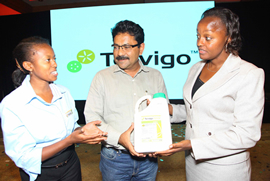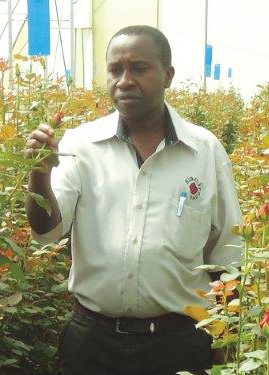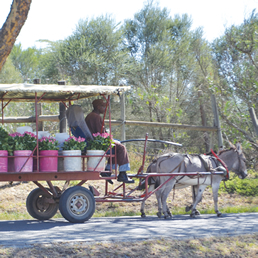The Green Farming and Chase Bank signed a partnership Agreement. “Chase Bank is looking to target the one billion shilling horticultural sector as it braces
Category: Featured Article (Mar-Apr 2015)
With mothers day approaching it’s the perfect time to look at what could help you boost your sales for the upcoming season. But does color

 As the air cargo industry is gearing up, newer markets in Latin America and Africa are opening up for exports. And Europe still continues to be a major importer of this commodity. The flower industry is very crucial to air cargo. Probably, because it is one of the few commodities that can still provide positive margins to the business.
As the air cargo industry is gearing up, newer markets in Latin America and Africa are opening up for exports. And Europe still continues to be a major importer of this commodity. The flower industry is very crucial to air cargo. Probably, because it is one of the few commodities that can still provide positive margins to the business.
“On average, we see an increase in production of 3-5 percent per year, which is higher than the global growth levels. It is important to mention that the industry continues to innovate on for example growing methods or packaging. It also continues to innovate and explore new species to be produced,” says Pieter Fopma, Air France-KLM cargo director for perishables.
The report that Kenya has lost a share of its global horticultural market over the past five years should send the national and county authorities
As the air cargo industry is gearing up, newer markets in Latin America and Africa are opening up for exports. And Europe still continues to
 It was pomp and dance as flower growers welcomed the entry of a first class nematicide for ornamental products. The launch came with an almost audio recorded oratory of Marcel Breedeveld, Product development Manager, Europe Africa Middle East, Lawn and Gardens not previously heard in Kenya.
It was pomp and dance as flower growers welcomed the entry of a first class nematicide for ornamental products. The launch came with an almost audio recorded oratory of Marcel Breedeveld, Product development Manager, Europe Africa Middle East, Lawn and Gardens not previously heard in Kenya.
In a more theatrical way, Mr. Breedeveld said, “In today’s growing environment- with constantly shifting social, economical, environmental and market priorities, every grower would vote for a product with significant crop enhancement effects through increased root mass and greening effect on leaves. In addition it should lead to more vigorous, healthier and higher yielding crops”.
Identification Most adult thrips are about 1 – 2 mm long, slender insects that possess piercing-sucking mouthparts. Barely visible to the naked eye, they have
Who is Andrew Tubei? (Background-personal and as a grower)
 I am the production and Technical Manager of Maasai flowers, one of the units of Sian group of farms. I’m enterprising and multi skilled grower with more than 13 years in the production of roses, Zantedeschia/ Calla lily and summer flowers. I believe in working objectively and business first mind frame which in turn helps me to improve efficiency, effectiveness and productivity. I work in a challenging and dynamic position with a solid firm that recognizes individual growth and personal contribution to the realization of company objectives.
I am the production and Technical Manager of Maasai flowers, one of the units of Sian group of farms. I’m enterprising and multi skilled grower with more than 13 years in the production of roses, Zantedeschia/ Calla lily and summer flowers. I believe in working objectively and business first mind frame which in turn helps me to improve efficiency, effectiveness and productivity. I work in a challenging and dynamic position with a solid firm that recognizes individual growth and personal contribution to the realization of company objectives.
You have been growing and selling flowers for most of your professional life, if you would have to give your remarks about being a grower, what would they be?
The production of cut flowers is both capital and knowledge – intensive. Due to the extreme sensitivity of the product, professional management and constant vigilance is needed during all phases of growing, packaging and shipping. Because fresh cut- flowers do not undergo any processing between harvesting and sale, growers are essentially producing a finished product. Cut flowers sold in direct markets often retain the identity of the individual grower, and growers who can successfully differentiate their products can attain profit levels far in excess of other producers.
1 Master the Basics
 Highly successful growers make it a habit to always include the fundamentals of growing when dealing with crop issues. These fundamentals or “Basics” refer to 5 considerations when growing a crop:
Highly successful growers make it a habit to always include the fundamentals of growing when dealing with crop issues. These fundamentals or “Basics” refer to 5 considerations when growing a crop:
• Air exchange: all plant life depends on Oxygen and Carbon dioxide and cannot survive long without it.
• Water exchange: second most important in a plant’s survival
• Nutrient exchange: mastering the basics of plant nutrient uptake can determine a great crop from an average crop.
• Light exchange: essential for photosynthesis
• Temperature stability: for both air and soil, specific for each crop.
Mastering these basics involves a complete understanding of how and why they affect the crop at every stage, without this knowledge the grower is unable to determine what conditions and techniques are best when managing the crop. The successful grower when making changes makes it a habit to not override the plant basics and hinder the goal of a quality crop.
A weak Euro
Firming up Dollar
Failing Russia Market
Ecuadorian Flowers Flood Europe
Horticultural products exporters to the European Union have been hit by a weak euro as the world’s second largest reserve currency against the Kenya shilling.
The local unit has been steadily gaining strength against the euro since July last year in what analysts say will have an effect on earnings from exports to Europe. The euro last dropped to these levels in mid-2012 when in touched Sh103.
A weak euro means fewer shillings for each euro exchanged thus dealing a double blow to exporters to Europe, as they invoice their produce in euros but procure their inputs in dollars.
The dollar has, on the other hand, been firming up against the Kenya shilling piling pressure on an import-dependent economy as importers have to folk out more shillings for a dollar.
